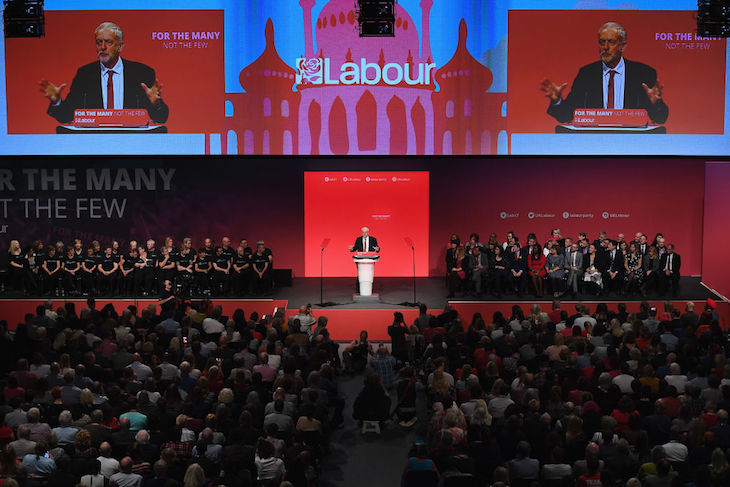Thirty years ago, the Conservatives would have had no problem countering what Jeremy Corbyn had to offer in Brighton. But as they gather in Manchester for their own conference, they know they are going to have to find a new way of appealing to a generation born after the fall of Soviet communism, which has no memory of (or interest in) the 1970s, with its industrial strife and moribund state-run industries.
Socialism, as we found out in June, is this year’s surprise hit. For younger voters struggling to find a way on to the property ladder, a bigger, all-embracing state may seem to be the answer. As for financial crises, the only one they have witnessed in their adult lives was one blamed on reckless banks. It is harder for them to appreciate the economic consequences of collectivisation, in spite of the admission by shadow chancellor John McDonnell that his policies might cause a run on the pound. He promises disruption, and there is a market for that. A great many young people have experienced stagnant wages and seen soaring house prices, and feel any other way must be a better way.
Free trade is the most effective way to encourage poverty reduction, social cohesion and conflict prevention
The Conservatives find themselves struggling to find a language which connects with voters born after 1973, most of whom opted for Labour at the last election. Indeed, they are struggling to find an agenda more broadly. But there is no shortage of issues to discuss. Labour’s decision not to debate Brexit at its conference showed that the party is mute on the single most important issue of the day. There is an opportunity here, if the Tories have the wit to seize it.
Most of those who voted for Remain now think the result of the referendum ought to be respected; slowly the divisions are starting to heal. The Conservatives ought to focus on this reconciliation, rather than pose as a group of crowing Brexiteers. The main concern among those who opposed Brexit is that Britain was turning in on itself, that nativism and populism were in the -ascendant. This seemed to chime with the Prime Minister’s often harsh tone, notoriously referring to the ‘citizens of nowhere’ and, to her shame, refusing to offer immediate assurances to EU nationals, something even Ukip advocated. She has had depressingly few warm words for our European allies, perhaps thinking that a combative stance would serve her well in a general election.
She sought to change the tone in her Florence speech, but far more needs to be done. She needs to talk about the opportunities of Brexit, specifically on opening up Britain’s economies in ways that the EU has struggled to do. She should return to the theme of her Davos speech — that in a world where protectionism is on the rise, Britain stands ready to be the world champion of free trade. And she should make the moral case for this: free trade lowers prices at home and strengthens friendships abroad. It is the most effective way to encourage poverty reduction, social cohesion and conflict prevention. And it can soon be the cornerstone of British foreign policy.
This is the message of the Institute for Free Trade, which launched recently at a Foreign Office reception hosted by Boris Johnson. Its emergence, and its close relationship with the Foreign Secretary, is an encouraging development. At times, it seems as if the Tories have forgotten how to talk about trade — the subject has, after all, been off the political agenda since we joined the EU four decades ago. A change of conversation is needed.
Brexit was not about walking away from Europe but about finding a better way of engaging with it, based on mutual respect and national sovereignty. This point is not filtering down into the Conservatives’ conversation with the electorate — in spite of its obvious appeal to a generation which takes for granted the freedom to travel the globe and to shop across borders. It is also a generation that cannot understand, for -example, why we have an immigration system that openly discriminates against people from the United States and India simply because they are not in the European Union. So this ought to be the new Tory creed: an internationalism that strikes new alliances while respecting national borders — and recognises that there is no contradiction between the two.
The appeal of free trade, backed by this magazine since its inception in 1828, has as much relevance now as then. There should be a very clear message from Downing Street: we want to do business with the EU, we want goods and services to flow across the Channel — and the Irish land border — just as they do now. But we also want free trade with the rest of the world. We can hope that the EU chooses co-operation, but if it erects barriers then we can speed up and redouble our efforts with nations beyond Europe.
Like the EU, the Conservative party has sometimes had a schizoid attitude towards free trade — for example, tearing itself apart over the Corn Laws. But if the Conservatives want to present the younger section of the electorate with an inspiring vision, there is no doubt which of its instincts must now be allowed to prevail.






Comments